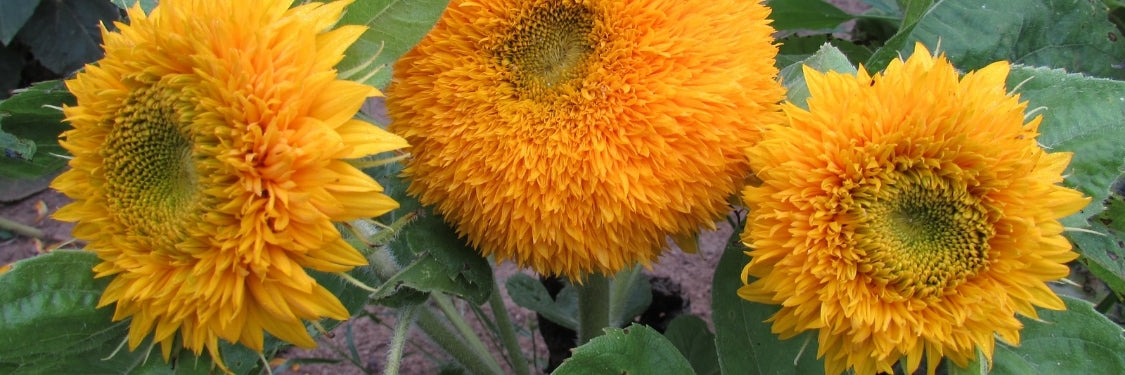Common Questions
What makes the Hudson Valley Seed Co. different?
We are passionate about our role as seed stewards, and that passion shines through in every facet of our business. We sell only non-GMO and open-pollinated seeds, specializing in rare, heirloom, and fantastic new varieties. We grow much of the seed we sell on our Certified Organic farm in New York’s Hudson Valley. Our Art Packs set us apart in the seed industry, each one utterly unique and designed by a different artist, each one a celebration of the diverse beauty of the plant world. Inside each Art Pack is the story of the seed as well as detailed growing instructions, plant preferences, and more seedy facts. If you have never seen inside an Art Pack, take a moment to gently open one up and explore!
What does open-pollinated mean?
Open-pollinated refers to varieties that are pollinated by natural means (wind, insects, birds, etc). The offspring remain true-to-type over many generations, meaning that when you save and plant seed from an open-pollinated variety, the plant that grows should resemble the former generation both in characteristics and yield.
Generally speaking, the opposite of an open-pollinated variety is a hybrid. Most people do not save seeds from hybrid varieties because the offspring are unlikely to look, taste, or yield the same as the parent. Having started out in 2008 as a community seed library, we remain committed to the history and ethos of seed-saving, and sell only open-pollinated varieties.
Which varieties are heirloom?
An heirloom is an open-pollinated variety that is recognized and cherished by a community of growers. There are differences of opinion about how old a variety needs to be to be considered heirloom, but most people would agree that any variety that has been around for 50 years or more would qualify.
All of our seed offerings are open-pollinated, but not all would be considered “heirloom.” Some are newer varieties bred by great contemporary plant breeders for adaptability, resistance to disease and pests, remarkable beauty and/or flavor. As seed stewards, we see our role as double: to preserve historic heirlooms, and to foster these wonderful new varieties for future generations. We call these our “heirlooms of tomorrow".
Which varieties are organic?
The majority (though not all) of our offerings are Certified Organic, including all of the varieties we grow ourselves. Varieties that are organic will say so below the name of the variety on the product web page. It's also marked on our seed packs.
Which varieties are most effective for attracting pollinators?
Many plants are loved by pollinators. You can search in each category (Flowers, Herbs, Veg) by selecting “Pollinator Attractors” under the Special Characteristics tab in the sidebar search.
Which varieties are best for container gardening?
Find all of our best seeds for your containers by selecting “Good for Containers” under the Special Characteristics tab in the sidebar when looking at seeds in any category (Flowers, Herbs, Veg).
Which varieties can be grown indoors?
The best varieties for growing indoors are the herbs (excluding a few varieties like Mammoth Long Island Dill and Stinging Nettle) and lettuces, especially the mixes, which are designed to be harvested early. With enough light, warmth, and space, you may also be able to keep some of the container varieties alive indoors.
Do you sell plants or seedlings?
Not during the majority of the year. We primarily sell seeds, and, during certain seasons, bulbs and tubers. However, we do have seedling sales across the year geared towards our local customers; we are unable to ship any seedlings. Sign up for our newsletter at the bottom of the page and be the first to hear about these and our other greatevents!
Can you help me plan my garden?
We currently do not offer design or garden planning services. Cooperative extensions have great resources to help with garden planning and we highly recommend “A Way to Garden" by Margaret Roach, and The . Plus, our blog has ten years-worth of gardening advice from our seedy staff.
I'm a store owner. Can I sell your seeds wholesale?
You can indeed! Our wholesale program allows you to sell our Art Packs, Seed Shakers, gift boxes, notecards, and calendars in your store, museum, garden center, gift shop, or other retail space. If you're interested, email wholesale@hudsonvalleyseed.com for information and access to our wholesale website.
I'm local. Can I stop in and shop?
Yes! The shop is now open 5 days a week. Our hours are Thursday-Monday 10am-4:30pm. We are closed Tuesday, Wednesday and all major Holidays. Come by and walk our trial gardens, visit our green house, and browse our curated selection of seeds, tools, fine art, and unique gifts!
If you'd like to order for local pick-up, choose the "pick up" option in our online checkout and we will email you when your order is ready. We're located at 11 Airport road, Accord, NY 12404. Customer service can be reached at 845-204-8769.
Can I come visit the seed farm?
In the past, we have enjoyed hosting tours and other fun events on our farm. And we are planning to bring them back in our new space! We will invite you very soon to our series of events. In the meantime, you can stop by our new space at 11 Airport road, Accord, NY, to walk our trial gardens, delight yourself with our botanical gallery art, and browse through our wide variety of seeds, tools and gifts!
Do you ship internationally?
We do not ship outside of the U.S. and Canada at this time. We ship most of our seeds and non-living items to Canada via USPS International Mail.
Do you have ongoing sales and deals?
Please, check our SALE collection.
We are also offering:
- Buy any 10 Seed Packs and get +1 FREE! Shopping cart must have 11 seed packs in the cart for the discount to be applied. Discount is only valid once per order and will apply to the seed pack of lowest value.
- Buy any 3 Meadow Shakers and get +1 FREE! Must have 4 shakers in shopping cart for discount to apply.
- Buy one pack of Select Bulbs, get 30% OFF a second pack. Offer only applies to Select Bulbs. Bulb choices can be mix and match. Discount will apply to the bulb pack of lowest value.
- Buy 12+ Dahlia packs, get 10% OFF your dahlia order.
Discounts are applied at checkout. Discount will apply to the corresponding product of least value.
Shipping Questions
Shipping Options
We offer a multitude of shipping options at checkout.
USPS
- Saver Shipping - Tracking is not available for this discounted shipping method. Saver methods have slower transit times and take up to 14 business days for delivery.
- Ground Advantage - Tracking provided. Delivery typically within 7 business days.
- Priority Mail - Tracking provided. Delivery typically within 2-3 business day, but not guaranteed by USPS.
- Priority Express - Tracking provided. Delivery within 1-3 business days, guaranteed by USPS.
UPS
- Ground - Tracking provided. Delivery within 1-7 business days depending on delivery radius to HVSC.
- 2nd Day Air - Tracking provided. Delivery typically by end of second day, but not guaranteed by UPS.
- Next Day Air - Tracking provided. Delivery guaranteed by end of following business day.
Free Shipping
- Free Shipping - Tracking is not available for our free shipping promotion. Delivery times vary, but similarly to Saver Shipping please allow up to 14 business days for delivery. May be UPS or USPS. If specific carrier required, please select a named option.
Free Shipping Offer
Free Shipping on Seed Orders over $60 We are now offering free standard shipping to our customers! All *seed pack* orders over $60 will automatically qualify for free shipping at check out. Note that this applies to seed *packs* only; this promotion excludes cover crop seeds due to their excessive weight. If you have completed a purchase with $60 worth of seed packs but are still seeing shipping charges, please be advised that those shipping charges exclude the seed packs in your order and are only the charges for the non-seed pack items in your cart. We do not guarantee that tracking will be available for orders using the Free Shipping Promotion.
Free Shipping on All Orders over $200 All orders—including both seed and non-seed products—that total over $200 will automatically qualify for free shipping at check out.
Exclusions: Wire hoops, row cover, compost, soil/seed starting medium (including amendments), garlic, shallots, fall-planted bulbs, potatoes, sunchokes, dahlia tubers and other live plant items. These items are either time sensitive and require special shipping (ie. live plant material) or are heavy and bulky items.
Free Shipping is only available for domestic orders shipping to the lower 48 states. Orders shipping to Canada, Alaska and Hawaii are excluded from this promotion.
Orders to PO Boxes outside the Northeast are excluded from this promotion. We will contact you for updated information if you enter a PO Box as an address.
Domestic Shipping Policy
Over 90% of regular orders are processed and shipped out by the next business day. We endeavor to ship all orders out within 2 business days. Some orders may take up to 3 business days, but this is not guaranteed. Tracking is only available for upgraded services and not guaranteed for orders using the Free Shipping promotion.
We ship via UPS and the United States Postal Service (USPS). Please allow two to four business days for order processing time before your order ships. Orders are shipped Monday through Friday only, excluding holidays. We do not ship on weekends.
You can select the following fulfillment methods for seeds and standard sized hardgoods:
USPS: Ground Advantage and USPS Priority Mail
UPS: Ground, UPS 3 Day Select, UPS 2nd Day Air and UPS Next Day Air
In-Store Pickup
Shipping or Fulfillment method is selected at checkout. All shipping fees are based on the weight and dimensions of your package, as well as the destination. The shipping fee quoted will include all portions of your order.
*Please note that there is a 1-2 day order processing time even with expedited shipping.
Once your order has shipped you will receive an email from us with the tracking number and estimated arrival date. HVSC is not responsible for any shipping delays once an order has been handed off to your chosen carrier.
International Shipping Policy
We do not ship outside of the U.S. and Canada at this time. We ship most of our seeds and non-living items to Canada via USPS International Mail.
Shipping to Canada We have many customers in Canada and successfully ship many packages across the border every day. We always recommend checking with CIFA regarding items you are ordering, particularly if you are placing a large order. Generally, quantities of small vegetable seeds (lettuce, tomato, kale) weighing less than 500g (seed weight not package weight), and large seeds (bean, corn, squash) weighing less than 1kg meet the 'small lot' import exemption and require no additional documentation. However, for very large orders, or in the case of certain vegetable types sent to certain provinces (for example, corn to BC), a Phytosanitary Certificate may be required. While these situations are rare, we advise checking CIFA for regulatory information before placing your order, as at this time we cannot provide a phytosanitary certificate.
Corn shipments to British Columbia are prohibited. There are no restrictions on corn to other provinces.
We are unable to meet requests for phytosanitary certificates.
We strongly advise shipping to Canada via USPS International Mail; you will be able to select this option at checkout. Shipments sent via UPS often incur high import broker fees that are out of our control.
We do our best to provide all of the required documentation and labeling on packages sent to Canada to provide the greatest relief to Canadian customers from import tariffs. Because most of our seeds are produced in North America and most of our products are manufactured here, most items in our catalog are exempt from duties. However, additional taxes such as GST may be assessed on arrival. The payment of these fees is the responsibility of the recipient. The Canada Revenue Agency and the Canadian Food Inspection Agency can provide you with the latest information.
We do not ship any vegetative materials such as tubers, bulbs, seedlings, or trees to any international destinations, including Canada.
Shipping to International Locations Other Than Canada Due to increasingly stringent laws surrounding the import of even small quantities of seed to many countries, in particular to the EU countries, we are unable to ship seed or plant orders to countries other than the US and Canada. We apologize for any inconvenience.
We do continue to make international shipments of items in our catalog that are not seeds or plants. All orders outside of the U.S and Canada ship at your own risk. We do not guarantee shipments to other countries, and will not refund or reship missing international packages. If duties or taxes apply, you will be contacted by your customs office when the package arrives in your country. Any duties, taxes, or importation fees relating to shipping internationally are the responsibility of the customer and not Hudson Valley Seed Company.
Shipping to PO Boxes
Please be advised that we are unable to ship large or bulky items to a PO Box. If you purchase Hoops, or other large items, please provide an alternative mailing address.
UPS is not able to deliver to a PO Box. If you would like your order to be delivered to your PO Box, please select an option from the USPS at checkout.
Shipping Fees
We offer a range of shipping methods for you to choose from. All shipping fees are based on the weight and dimensions of your package, as well as the location. The shipping fee quoted will include all portions of your order.
In-Store Pick-up
If you live locally it's absolutely possible to forgo the shipping expenses and pick up your order in person. At checkout, simply select 'Pick Up' under the delivery options. Your order of “immediate fulfillment” items will usually be ready in 2-4 business days and we'll email you when it's ready. No order fulfillment takes place on weekends or holidays.
Any seasonal pre-order items will arrive for pickup within the designated shipping/fulfillment window listed for those items.
All Orders will be available to pick up for 30 days. You are welcome to pick up any immediate fulfillment items (ie: seeds + tools) as soon as they arrive, or wait until your seasonal items become available as well, and retrieve your complete order in one trip. You will receive a “Ready to Pickup” as each portion of your order becomes available. All fully completed orders (ie: seeds + tubers) left longer than 30 days will be restocked.
*Please note that packages can only be picked up during our regular store hours.
Current pick-up hours:
Thursday through Monday 10AM until 4:30PM; Tuesday, Wednesday & Holidays: Closed.
Seasonal Items
If your order contains any of our seasonal items (list below), those items will be shipped in accordance with spring/fall planting dates based on your location. Seasonal items ship chronologically based on when the order was placed.
If you purchase seeds and a seasonal item at the same time, you will receive two shipments, a prompt shipment of any non-seasonal items, followed by a shipment of your seasonal items during the assigned shipping window.
*Please Note: The date listed in the Availability section for the product is the start of the shipping and fulfillment window. Your order will be fulfilled chronologically based on its spot in the queue
If there are multiple ship dates, the shipping quote you receive will cover these multiple shipments.
Garlic, Shallots - Start shipping mid-late September.
Fall Bulbs - Shipping September - November, depending on variety.
Potatoes - Shipping early April - Early June.
Sweet Potatoes - Shipping June 1st -July 1st.
Sunchokes - Shipping April 20th - May 10th.
Dahlia Tubers, Potatoes, Sunchokes - Start shipping mid April.
Seedling Sale (live plants) - Available for in-person pick-up only. Our seedling sale is held each spring. Please sign up for our newsletter to receive alerts.
What happens if my package is lost, stolen, or damaged in transit
Lost in Transit: If you suspect your package has been lost in transit, please contact us immediately.
A package with tracking is considered lost when 7 business days have passed with no movement or scans shown in the tracking updates.
A package with no tracking number is considered lost if not delivered with 14 days of shipping.
If the above criteria has been met please contact us and we will replace or refund your order.
Lost/Missing After Delivery Scan: Frequently the USPS will mark packages as "Delivered" when loading their trucks and not at the actual time of delivery. Please allow 1-2 business days if your order was shipped via USPS. The majority of packages arrive on our customer's doorstep or mailbox the day after the delivery scan. If you do not receive your package in that time frame, please file a claim with the USPS. If you suspect that your order has been stolen or tampered with, please file a claim with the carrier. You may also need to file a police report depending on the order total. After your claim has been filed, please contact us with your claim number and we will provide any necessary supporting documents. HVSC is not responsible for any packages that have a proof of delivery. Business, Renters and Home Owners Insurance Policies likely cover indemnity.
Damage: If your package arrives damaged, please contact us via email including pictures. For orders totaling $50 or more, we require that the purchaser file a claim with the carrier before we reship the order. Once the claim has been filed, HVSC will send out a replacement.
Please reach out to us via email at mail@hudsonvalleyseed.com or by phone (845) 204-8769
Refunds and Returns
What happens if my package is lost, stolen, or damaged in transit?
Lost in Transit: If you suspect your package has been lost in transit, please contact us immediately. A package is not considered Lost until 7 days have passed with no movement or scans shown in the tracking updates. If, after 7 days, the order is still showing no updated movement, please contact us and we will replace or refund your order.
Lost/Missing After Delivery Scan: Frequently the USPS will mark packages as "Delivered" when loading their trucks and not at the actual time of delivery. Please allow 1-2 business days if your order was shipped via USPS. The majority of packages arrive on our customer's doorstep or mailbox the day after the delivery scan. If you do not receive your package in that time frame, please file a claim with the USPS. If you suspect that your order has been stolen or tampered with, please file a claim with the carrier. You may also need to file a police report depending on the order total. After your claim has been filed, please contact us with your claim number and we will provide any necessary supporting documents. HVSC is not responsible for any packages that have a proof of delivery. Business, Renters and Home Owners Insurance Policies likely cover indemnity.
Damage: If your package arrives damaged, please contact us via email including pictures. For orders totaling $50 or more, we require that the purchaser file a claim with the carrier before we reship the order. Once the claim has been filed, HVSC will send out a replacement.
Please reach out to us via email at mail@hudsonvalleyseed.com or by phone (845) 204-8769
What if my order is incorrect or contains damaged items?
Please open and inspect your package upon receipt and report any missing or damaged items to us within 30 days. Reports can be made via email at mail@hudsonvallyseed.com or by phone at 845-204-8769. We will gladly correct any mistakes we’ve made as quickly as we can. Defective, incorrect or missing items reported outside of the 30-day window will not be replaced.
My seeds haven't germinated or grown well. What can I do?
Please let us know if you have growing and/or germination issues. We are always happy to help when we can. We test all of our seeds for germination twice each year and will do our best to provide solutions. We guarantee our seeds for the Packed for Year listed on the pack or 6 months from the purchase date, whichever is longer.
Email us at mail@hudsonvalleyseed.com or call us at 845-204-8769.
I would like to cancel my order of Sesonal Items. What do I do?
If you have placed an order of Dahlias, Potatoes, Garlic, Shallots, Sunchokes, Spring or Fall-Planted Bulbs or live Seedlings, you may cancel your order within 7 days of purchase, granted that the order has not entered the fulfillment process.
Any seasonal items cancelled after the 7 day window will incur a 20% restock fee, which will be deducted from your refund. All live plant products, which include seedlings, dahlias, potatoes, sunchokes, garlic, shallots, and bare root trees, are non-returnable.
If you have experienced a quality issue with your seasonal item, please contact us within 7 days of receipt.
Return FAQs
Yes, unopened, undamaged, non-seasonal items can be returned to us within 30 days of purchase for a full refund. Live plant and seasonal items such as tubers, bulbs, potatoes, garlic, etc. are non-returnable. When returning non-damaged goods, the buyer is responsible for shipping charges. We advise that customers returning goods select a shipping method that provides a tracking number in order to verify receipt of the goods to our office. Cash refunds are not available for products ordered via our website. Refunds will be made to the payment card used to place the original order. Refunds are made within three business days of receipt of returned goods at our office.
To begin the return process, please contact us to make arrangements before you send your items back. We will promptly advise you of the shipping address and help you resolve any concerns related to your order.
Refund FAQs
If you have received damaged or spoiled items, we will be happy to replace the items, if available, or to issue a refund or store credit. Unfortunately, due to system limitations, we are unable to issue refunds for any orders over 120 days. In the event that a refund is warranted 120 days or more after purchase, we will provide you with a store credit. Each credit card processor has their own limitations regarding refunds time limits and we do our best to refund or credit based on these limitations.
Please note that seed packs can only be refunded or replaced within the Packed for Year listed on the pack or within 6 months of purchase, whichever is longest.
Event Cancellation Policy
HVSC event tickets are non-refundable to the purchaser with the following exceptions-
Cancellation by a Party: If either the Vendor or the Venue cancels the workshop, the purchaser will receive a full refund.
Weather-Related Cancellations: If severe weather conditions prevent the workshop from taking place and if there is not a scheduled make-up date, tickets will be fully refunded to the purchaser.
Tax Exemptions
If you are a farmer or other Tax Exempt entity looking to purchase items from our website and regular inventory without sales tax, please email us at mail@hudsonvalleyseed.combefore your purchase. Please include your Business Name, address and attach your Tax Exempt form. We will happy to assist you in completing your tax-exempt purchase. Please note that we are unable to remove your sales tax after your purchase is completed, so please contact before completing your purchase to ensure a smooth transaction.
Art Submission
We believe in the Art of Seed. We commission custom artworks annually for our Art Pack seed line. If you would like to apply, please follow the link below and complete the art submission application. Art Submission
Our creative team reviews artwork on a rolling basis and will reach out to you directly if they would like to discuss collaboration for the Art of Seed line.
Seed Donations
Thank you for inquiring about our Seed Donation Program. We are proud to be working with Cooperative Gardens Commission to help distribute our donation seeds. They are a non-profit dedicated to getting seeds into the hands of the community.
You can apply to receive seed donations through their website by filling out their Seed Hub Application.
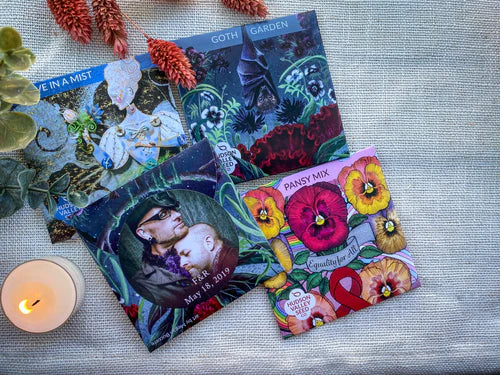
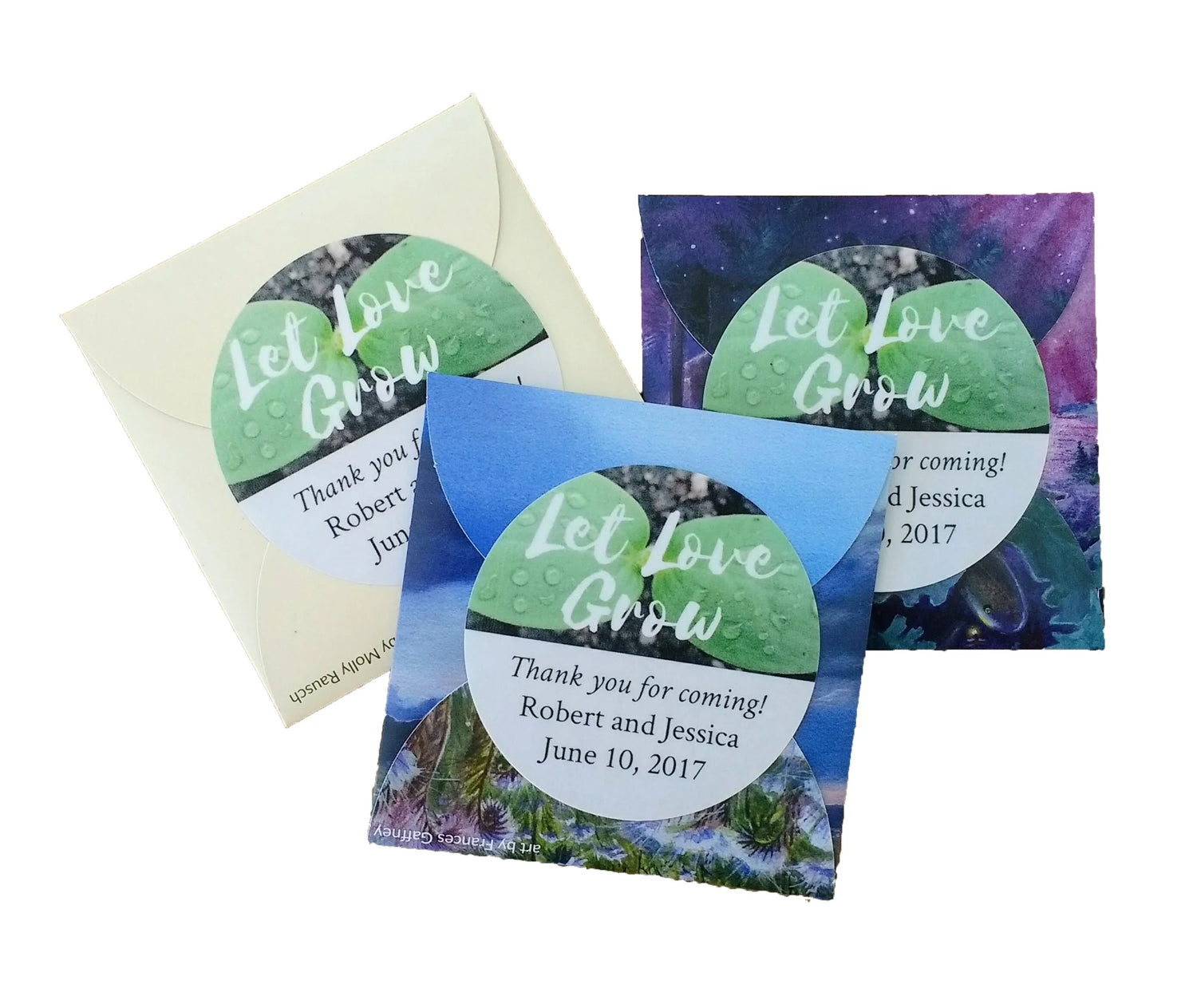
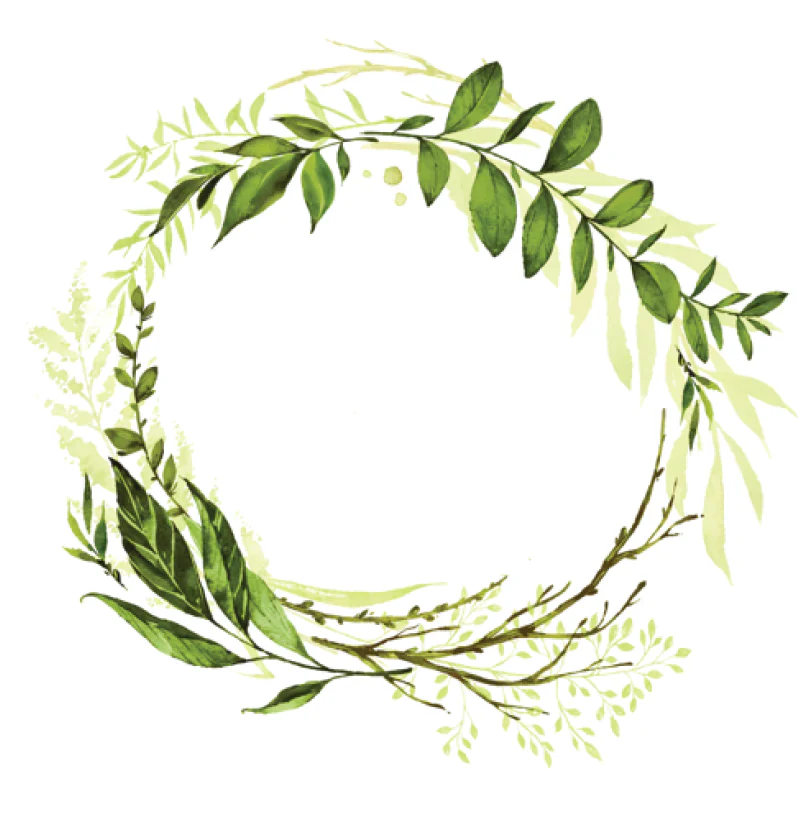
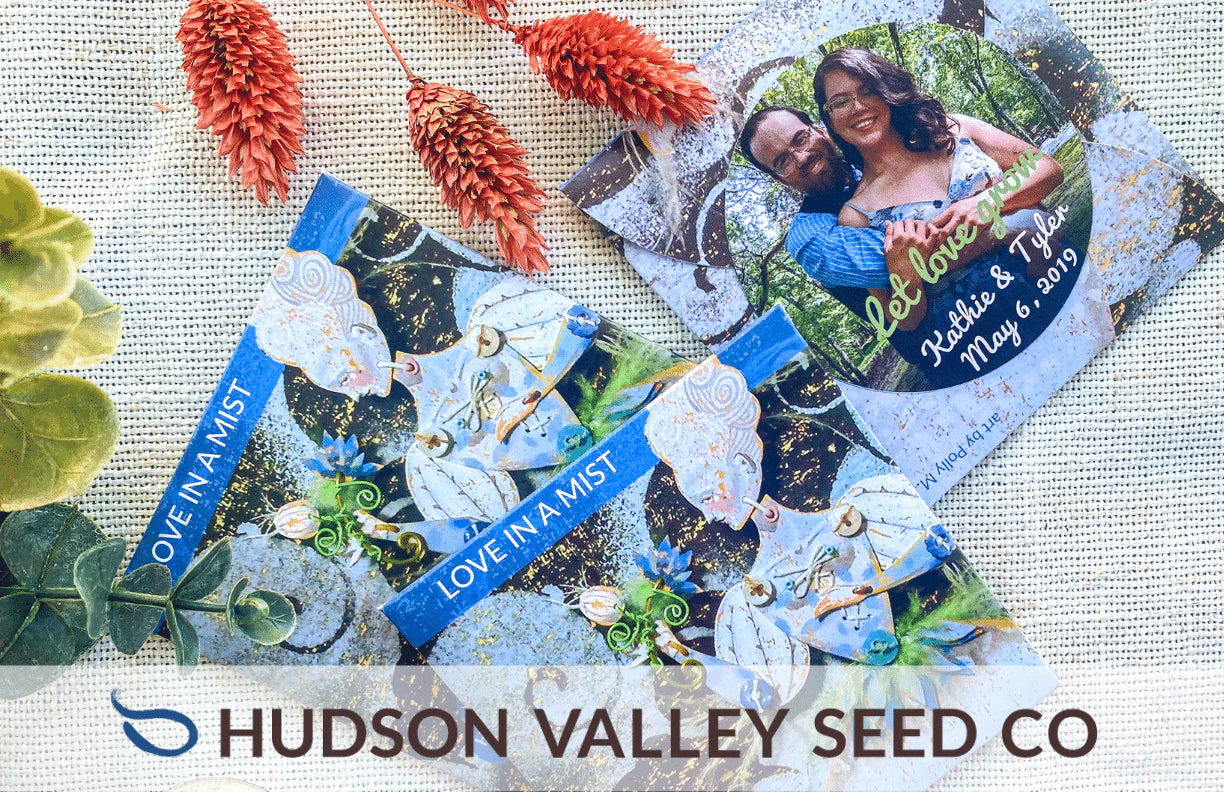
Weddings & Custom Orders
Simple or elaborate, weddings are made for making memories.From rustic farm venues to elegant event halls, every wedding is unique because every couple is unique. And for such a special occasion, no detail is too minor: from the font size on the invitations to the frosting on the the cake.
Sow even more joy on their big day–with customizable Hudson Valley Seed Company Art Packs!Our artist-designed seed packs make great conversation starters at guest tables, add whimsy to gift bags, and personalize thank you notes.
The customizable stickers have space for names, dates, a favorite photograph, and other important details.With over one hundred unique designs to choose from, it's easy to match theme, style, or color scheme. Plus, wedding guests will enjoy the opportunity to sow these "seeds of love" at home, in honor of the lucky couple.
Our Art Packs also suit couples who wish to showcase their commitment to an earth-friendly future.The Hudson Valley Seed Company is committed to growing organically, sourcing locally and sustainably, and preserving crop diversity.
If we have not answered your questions please email us at mail@hudsonvalleyseed.com or call us at 845-204-8769.


